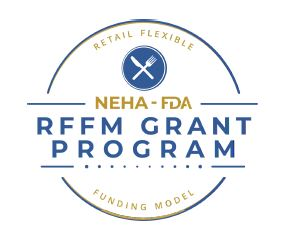Retail Program Standards Mentorship Program

Funded through a five-year cooperative agreement between NACCHO and the U.S. Food and Drug Administration (FDA), this program has historically connected retail food regulatory program practitioners who are experienced in the Retail Program Standards with those who are newly enrolled and looking for assistance, resources, and recommendations for achieving a specific standard. Eligible participants include food regulatory programs operating at the state, local, tribal, and territorial (SLTT) level. The RPS Mentorship Program continues to be offered to SLTT agencies under the Retail Flexible Funding Model (RFFM) Grant Program from the National Environmental Health Association and the FDA.
Sharing Sessions: Save the Date
- Date and time for first MENTOR sharing session: Wednesday, April 3rd at 4:30 pm ET
- Date and time for first MENTEE sharing session: Wednesday, April 10th at 4:30 pm ET
End-of-Year Meeting: Save the Date
- Dates: Oct 29, 2024 - Oct 31, 2024
- Location: Drury Plaza Hotel, St. Louis at the Arch, 2 South 4th Street, St. Louis, MO
- Attendees should use this link to register by May 24
End-of-Year Planning Committee: If you’re interested in helping us plan the agenda and identify presenters, contact [email protected].
Contact Information: Please reach out to [email protected] with any questions or concerns with your grant.

The NEHA-FDA Retail Flexible Funding Model Grant Year 3 Request for Applications closed October 11, 2023.
Learn more at: neha.org/retail-grants.
Funded by the NEHA-FDA Retail Flexible Funding Model Grant Program, Supported by the FDA under award U2FFD007358.
Browse resources about NACCHO's Retail Program Standards Mentorship Program and about the Retail Program Standards themselves.
Watch this brief video about the value of the NACCHO Mentorship Program:
The resources below focus on the FDA Retail Program Standards.
From 2018-2019, NACCHO published a monthly blog series highlighting the experiences, challenges, and successes of jurisdictions that have worked toward each standard:
Self-Assessment, featuring Chatham County Health Department (NC) and Marlborough Health Department (MA)
Standard 1, featuring Hoke County Health Department (NC) and Health Department of Northwest Michigan (MI)
Standard 2, featuring New River Health District (VA) and Cheyenne-Laramie County Health Department (WY)
Standard 3, featuring Marion County Health Department (IN)
Standard 4, featuring Angelina County and Cities Health District (TX) and Rappahannock-Rapidan Health District (VA)
Standard 5, featuring Fairfax County Health Department (VA)
Standard 6, featuring Jersey County Health Department (IL)
Standard 7, featuring Lake County General Health District (OH)
Standard 8, featuring Vineland Health Department (NJ)
Standard 9, featuring Division of Environmental Health and Safety, Wake County (NC) and Summit County Public Health (CO)
Bonus Post: In September, 2018, Gwinnett, Newton and Rockdale (GNR) County Health Departments in Georgia joined only four other jurisdictions nationwide to meet all nine of the Retail Program Standards. Read a blog post about their experience.
During this webinar, presenters from the Food and Drug Administration (FDA) and Southern Nevada Health District, Nevada discussed the purpose of the database and how the database assists jurisdictions in meeting Standard 9 of the FDA Voluntary National Retail Food Regulatory Program Standards. In addition, presenters discussed the database’s functions and provide an example of how a local retail food regulatory program has utilized the database for their retail risk factor study.
Presenters:
Michael Nordos
Regional Retail Food Specialist
Food and Drug Administration
Christine Sylvis
Environmental Health Supervisor
Southern Nevada Health District, NV
During this session, two local health departments that participated in NACCHO's mentorship program shared lessons learned, successful strategies, and tactics on how to get started with the FDA Retail Program Standards.
During this webinar, presenters from local jurisdictions that have met all nine of the Retail Program Standards discussed how they met all the standards, sustained momentum in working on the standards, and the benefits of meeting standards. They also discussed the benefits of conducting a risk factor study.
Additional Resources:
This session focused on the Retail Program Standards 3 (Inspection Program Based on HACCP Principles) and 6 (Compliance and Enforcement). The session began with an overview of Standards 3 and 6 and resources that are available to assist jurisdictions in meeting the Standards. Presenters from local jurisdictions described the relationship between the two standards, how they have worked to conform to the Standard requirements, and shared tips and resources they have learned from the process.
Webinar Materials:
Standard 6 Resources:
During this session, two local health departments experienced with Standard 4 and FDA Staff shared their experiences, tips, and challenges on Standard 4. Participants had the opportunity to ask questions during a Q & A session.
During this session, the Fairfax County Health Department in Virginia described their efforts to help retail food establishments improve compliance with the employee health requirements in the FDA Food Code. The presentation highlighted how the health department used compliance data to develop and implement an intervention strategy to improve compliance, overcome challenges, and to respond to the results they have seen so far.
Upon completion of this webinar session participants will be able to:
- Explain the purpose and objectives for conducting a retail food risk factor study
- Discuss how conducting a retail food risk factor study can benefit a jurisdiction’s retail food protection program
- Summarize the Standard 9 Program Assessment criteria for conducting a retail food risk factor study
Presentations
Presentation PDF Part I
Presentation PDF Part II
Presentation PDF Part III
Additional Materials
FDA Retail Food Risk Factor Study Protocol
Draft Standard 9 - January 2017
Updated Restaurant Data Collection Form for FoodSHIELD
This session focused on the mechanics of actually conducting a study based on the experiences of two very different jurisdictions. What did they have to plan and decide before starting the field data collection part of the study? This discussion will hopefully help jurisdictions in designing and conducting a risk factor study. Every jurisdiction has different needs and different levels of resources to conduct a study. There is no one set way to conduct a study. Jurisdictions must make the best choices based on the resources and limitations within their programs.
Webinar Materials:
Question and Answer Document
Webinar Slide Deck
The Conference for Food Protection (CFP) is a non-profit organization created to provide a formal process whereby members of industry, regulatory, academia, consumer and professional organizations are afforded equal input in the development and/or modification of Food Safety Guidance. Such guidance is incorporated into food safety laws and regulations at all levels of government throughout the United States. During this session, CFP Council and Committee members and the Food and Drug Administration provided an overview of the CFP, discussed about the Issues submission process, types of Issues submitted, how Issues connect with the Food Code and the Voluntary National Retail Food Regulatory Program Standards (Retail Program Standards), and how to become involved. Participants had the opportunity to ask questions during the Questions and Answers portion at the end of the session.
Webinar Materials:
Presentation slides
Webinar Recording
Chat Transcript
More food safety sharing sessions are available at the NACCHO Food Safety/Defense Webpage.
Below are FDA Retail Program Standards example policies and forms.
For more examples and to share documents, email [email protected] to join the Retail Food Program Resources Center workgroup on FoodSHIELD.
- 2014 Alexandria Food Code (Alexandria Department of Health, VA)
- Oklahoma Food Code (Tulsa City-County Health Department, OK)
- Manager Certification & Employe ePermit Requirement (Tulsa City-County Health Department, OK)
- Food Advisory Council Minutes (Tulsa City-County Health Department, OK)
- Bare Hand Contact Packet (Tulsa-City County Health Department, OK)
- Affidavit (St. Louis County Health Department, MO)
- Field Training Manual (Fairfax County Health Department, VA)
- Establishment Categories (Fairfax County Health Department, VA)
- EHS Training Courses Checklist (Thomas Jefferson Health District, VA)
- Field Training Plan and Log (Thomas Jefferson Health District, VA)
- Assessment of Training Needs/Documentation of Successful Completion (Fairfax County Health Department, VA)
- Assessment of Training Needs Field Training Worksheet (Fairfax County Health Department, VA)
- EPHS Skills Evaluation (Fairfax County Health Department, VA)
- Staff Standardization Dates (Fairfax County Health Department, VA)
- Training Best Practice for EHS Food Staff (Thomas Jefferson Health District, VA)
- Training Spreadsheet (Thomas Jefferson Health District, VA)
- Disposition Sheet (Tulsa City-County Health Department, OK)
- Food Establishment Inspection Form (RiverStone Health, MT)
- Food Establishment Inspection Report_RF_PHI__GRP_01 (Fairfax County Health Department, VA)
- FSS Corrective Action Followup Policy (Fairfax County Health Department, VA)
- FSS Inspection Frequency Policy (Fairfax County Health Department, VA)
- Employee Illness Agreement (Tulsa City-County Health Department, OK)
- Inspection Frequency Policy (Thomas Jefferson Health District, VA)
- Blank Risk Control Plan (Thomas Jefferson Health District, VA)
- Risk Factor Assessment Inspection Form Marking Instructions (Fairfax County Health Department, VA)
- NC Marking Instructions (Wake County Environmental Services, NC)
- Quality Assurance Program (City of Vineland Health Department, NJ)
- Quality Insurance Inspector Report (City of Vineland Health Department, NJ)
- Quality Assurance Field Evaluation Form (Thomas Jefferson Health District, VA)
- Quality Assurance File Review Form (Thomas Jefferson Health District, VA)
- Quality Assurance Policy (Thomas Jefferson Health District, VA)
- Wake County EH QA Policy (Wake County Environmental Services, NC)
- Procedure For Filing Reports (Gwinnett County Environmental Health Department, NC)
- Review Form For Inspection Ride Alongs (Gwinnett County Environmental Health Department, NC)
- Quality Assurance Written Procedures (Gwinnett County Environmental Health Department, NC)
- Compliance Policy (Alexandria Health Department, VA)
- Enforcement Policy (Alexandria Health Department, VA)
- Enforcement Tracking Sheet (Alexandria Health Department, VA)
- Food Safety Enforcement Flow Charts CFM Violations (Alexandria Health Department, VA)
- Food Safety Enforcement Flow Charts Imminent Public Health Hazard (Alexandria Health Department, VA)
- Establishment File Worksheet (Alexandria Health Department, VA)
- Retail Food Inspection Procedures (City of Vineland Health Department, NJ)
- Work Order Food Establishment (Platte County Health Department, VA)
- 2012 Customer Service Evaluation (Alexandria Health Department, VA)
- Acceptable Tags (City of Vineland Health Department, NJ)
- Food Safety Advisory Group Meeting Notes (RiverStone Health, MT)
- Food Class Evaluation (Platte County Health Department, MO)
- Letter to Farmers Market (Platte County Health Department, MO)
- Handwash Label (Wake County Environmental Services, NC)
Click on a state below to view NACCHO Mentorship Program participant information in that state. (Note*: after clicking on the state, scroll down to find the link to view the information.)
Currently, the map is limited to a select number of states and territories. To view Saipan, Northern Mariana Islands' mentorship profile, click here.
Environmental Health Program
Chelsea Gridley-Smith
Director of Environmental Health
JavaScript is required to reveal this message. / Email
Environmental Health Program
Nicholas Adams
Senior Program Analyst, Environmental Health
JavaScript is required to reveal this message. / Email
Environmental Health Program
Tiara Smith
Program Analyst
JavaScript is required to reveal this message. / Email
Environmental Health Program
Aliyah Al-Sadi
Program Analyst, Environmental Health
JavaScript is required to reveal this message. / Email